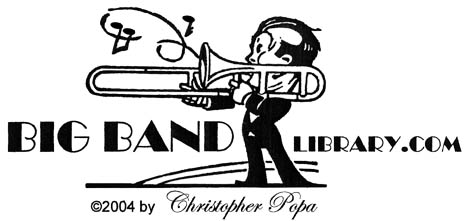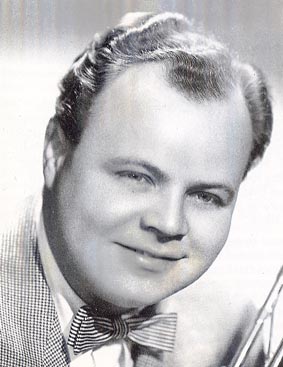
vital stats:
given name Charles William Butterfield
birth Jan. 14, 1917, Middletown, OH
death Mar. 18, 1988, "had been ill with throat cancer for months but died of heart failure"
first wife
son Michael Butterfield
son Patrick Butterfield
second wife Dorothy ("Dottie") Smith, a singer, m.1952?
daughter Deborah Curtis
daughter Judi Burke
military service U.S. Army, 1945-46
residence Rescue, VA, 1959-60; North Palm Beach, FL, 1970s
After he completed military service and formed his own, touring big band in 1946, Capitol was happy to record and release Butterfield's discs, hoping for more hits. They assigned him to do certain pop ballads (such as More Than You Know, Rumors Are Flying, and Sooner Or Later) and standards which he played in a swinging manner (Ain't Misbehavin', My Heart Stood Still). The band also recorded some jazzy originals (including Billy the Kid, The Sharp Scarf, and Wild Oats) as well as new versions of a couple of old favorites, What's New and Stardust, tunes on which Butterfield had been featured with Crosby and Shaw, respectively.
Billy Butterfield In His Own Words:
"I guess though, that there was more opportunity for actual jazz playing with Crosby - it was
such an interesting book to play, because sometimes the lead part would change around in
the middle of an arrangement, and of course there were always the Bobcats. When Yank
[ Lawson ] left the band I took over the trumpet in the Bobcats and we did some really nice
records."
"I was with Shaw for about a year, until he broke the band up . . . I had some feature
playing to do with Shaw, but with Benny, I was mostly on lead. Cootie Williams did most of
the solo work, and of course all the sextet playing. I would get eight bars here and four bars
there, but it was mostly slogging away."
"When I went into the studios later on, we used to take every chance we could to go out
and play jazz - lots of the guys did. There was very little jazz played in the studios."
Things started out very well for Butterfield and his orchestra, but as public tastes changed, the band business fell apart.
While on tour in Omaha, NE, Butterfield got a wire from his booking agency instructing him to return to New York immediately, that there were no more bookings scheduled. So back they went, with the sidemen being kept on half-salary.
The group eventually went out on the road again, but at that point the jobs were paying very little money. It just wasn't the same, so around 1948-49 Butterfield broke up his band and returned to the studios.
Although his name was shown on the covers and labels of lots of big band records after that, they were all studio groups.
For example, in late 1956, Walter Rivers, an RCA artists and repertoire ("A & R") man, telephoned Butterfield, asking him to record a dozen songs for an album, but he warned that they had to be completed before the end of the year. On December 5th, 7th, and 10th, Butterfield and a 13-piece ensemble made the disc, released as "They're Playing Our Song" [RCA Victor LPM-1441]. Besides him, the band was chock full of former name band musicians including trumpeters Tony Faso, Bernie Glow, and Jimmy Nottingham; trombonists Lou McGarity and Cutty Cutshall; clarinetist Hank D'Amico; saxophonists Toots Mondello, Nick Caiazza, Boomie Richman, and Danny Bank; pianist Mickey Crane; bassist Jack Lesberg; and drummer Cliff Leeman.
As Butterfield later reminisced to writer Alan Littlejohn, "It turned out that RCA had made so much money with Elvis Presley that year that they wanted to cut some sides to show as a tax loss, to save them getting crucified by the taxman! So, one of my claims to fame is that I was a tax loss for Elvis Presley!"
Perhaps Butterfield was just being modest, because he was invited him back for three more LPs under his own name, "A Touch of the Blues" [RCA Victor LSP-1566] around June 1957, and featuring singer Lee Wiley and the arrangements of Al Cohn and Bill Finegan; "Thank You for a Lovely Evening" [RCA Victor LSP-1590] in July and August 1957, with Butterfield's wife, Dottie, on vocals; and "A Lovely Way to Spend An Evening" [RCA Victor LSP-1699] in January 1958, all instrumentals. As before, each project utilized former big band players, including, variously, trumpeters Joe Ferrante, Doc Severinsen, and Nick Travis; trombonists Eddie Bert and Warren Covington; saxophonists Peanuts Hucko, Deane Kincaide, and Milt Yaner; guitarists Mundell Lowe, Barry Galbraith, and Bucky Pizzarelli; bassists Milt Hinton and Bob Haggart; and drummers Don Lamond and Osie Johnson.
In addition, Butterfield took part in two all-star albums conceived by RCA Musical Director Fred Reynolds and recorded in June and July 1958, "The Big 18: Live Echoes of the Swinging Bands" [RCA Victor LSP-1921] and "The Big 18: More Live Echoes of the Swinging Bands" [RCA Victor LSP-1983]. Reynolds hoped to present "some of the great arrangements from the swinging bands as a springboard for improvisation by some of the great sidemen who made up the old bands." Both LPs came out as desired.
There actually had been a record for RCA before all of those others, "New York Land Dixie" [RCA Victor LPM-1212], done in October and November 1955, using an all-star sextet collectively identified as "Gus Hoo and His Dixie Stompers" and individually listed under pseudonyms. Butterfield was shown on the cover as "Gus Hoo"; McGarity, "Erskine Tearblotter"; clarinetist Hal McKusick, "Fefe Phonphum"; Richman, "Mad Milt Summerblouse"; pianist Moe Wechsler, "Baldy Wynn"; Hinton, "Junior Hifitz"; and Lamond, "Zane Grudge."
Between 1959 and 1963, Butterfield recorded a number of albums for Columbia, including two with his old Crosby and Shaw bandmate, trombonist-arranger Ray Conniff, "Conniff Meets Butterfield" [Columbia CS 8155] and "Just Kiddin' Around" [Columbia CS 8822].
Butterfield continued to perform into the 1980s at various clubs and concerts across the U.S., as well as in the United Kingdom, Europe, and Africa - but never got too far away from his big band roots.
In 1968, Butterfield was selected as a charter member of the so-called "World's Greatest Jazz Band," led by Yank Lawson and Bob Haggart, two erstwhile Crosby friends. He remained with them until 1972.
Butterfield performed in New York City as part of a salute to Artie Shaw's Gramercy 5 with pianist Johnny Guarnieri in 1974, and also reunited from time to time with Bob Crosby (sometimes in the company of Lawson, Haggart, Eddie Miller and others), including a memorable outdoor concert in San Diego, CA in 1985.
"I haven't worked in a big band regularly for many years," he told Alan Littlejohn, not long before Butterfield passed away. "In the thirties and forties when they were the thing and you were a rated player, you could always pick and choose who you played for, so there was plenty of variety . . . the big leaders all had their own idiosyncrasies; there are loads of stories about Benny and Artie and the Dorseys and all their funny ways. Lots of them are true, but the thing is, they were all business men, and successful ones at that, and this you cannot knock."
sources:
"Billy Butterfield, 71, Big-Band Trumpeter On Shaw's 'Stardust,'" New York Times,
Mar. 19, 1988.
Leonard Feather, "Butterfield, Billy," in The Encylopedia of Jazz (New York City: Horizon
Press, 1955), p.150.
Roger D. Kinkle, "Butterfield, Billy," in The Complete Encyclopedia of Popular Music and
Jazz 1900-1950: Volume 2 Biographies A Through K (New Rochelle, NY: Arlington
House Publishers, 1974), p.653.
---, "Butterfield, Billy," in Leading Musical Performers (Popular Music and Jazz) 1900 - 1950
(Mt. Vernon, IN: Windmill Publications, Inc., 1999), p.43.
Alan Littlejohn, "Billy Butterfield," Jazz Journal international, 1985?.
Tom Lord, "Billy Butterfield," in The Jazz Discography (West Vancouver, British Columbia,
Canada: Lord Music Reference, 1992), pp.B1063-1070.
Lois Timnick, "Remembered for 'What's New' Billy Butterfield, 71; Major Jazz Trumpeter,"
Los Angeles Times, Mar. 19, 1988, p.32.
I would like to expand this tribute with, if possible, a new interview of someone who was important to Billy Butterfield's life or career. Are you an alumnus of his band, a member of his family, or a collector who is knowledgeable about his accomplishments? Please contact me via e-mail
return to "Biographical Sketches" directory
go to Big Band Library homepage
The big bands are back
in a new and exciting way!
BILLY BUTTERFIELD
"ON LEAD, SOLOS, AND FEATURES"
by Music Librarian CHRISTOPHER POPA
September 2008
Around the age of 13, he began playing the trumpet professionally and left school to tour with a band. (He never went back.)
He blew his horn in a relaxed jazz style, with lyrical ideas and a big, pure tone that helped to enhance the bands of others, namely Bob Crosby [1937-40], Artie Shaw [1940-1941], Benny Goodman [1941-1942], and Les Brown [1942].
Over the next few years, Butterfield recorded about a dozen sides for Capitol, and received credit on the label as "his" orchestra. On the two of those records which entered the Billboard popularity charts, My Ideal and Moonlight in Vermont, he played solos but vocalist Margaret Whiting was given top billing.
